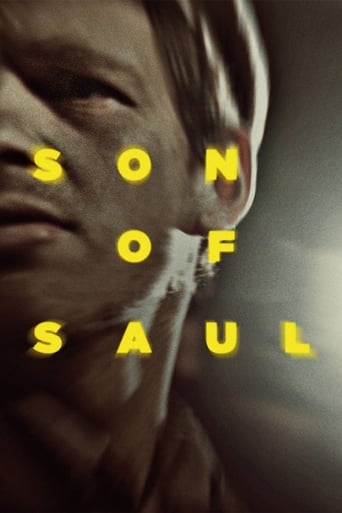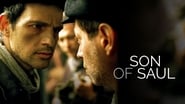jc-osms
I found this film almost as difficult to review as I did to watch. I guess many of us might fail to imagine the horrors of trying to survive Auschwitz on a minute by minute never mind hourly or daily basis but this film puts you almost literally on the shoulders of one man in the camp as the camera only rarely changes perspective from his subjective viewpoint to a more objective position so that you see what he sees and experience what he experiences. Immediately you sense the dehumanization of the individual as with him and his specially chosen fit and able fellow POW's he performs the task of removing, burning and disposing of the remains of the hundreds of daily gas victims there. When he sees a young boy somehow survive the gassing only to be even more cruelly murdered by suffocation by the German doctor on the scene, he impulsively decides to take the boy's dead body and have it consecrated by a rabbi.Along the way he gets involved in a mass escape attempt by his fellow inmates but even then carries the boy's corpse with him as he moves. As I said, the movie was excruciating to watch at tine. Think of all the famous (or infamous) cultural or artistic depictions of hell by the likes of Dante, Hyronemus Bosch Picasso, Goya and others.
Roger Burke
The Holocaust perpetrated by Nazi Germany in World War II is a touchy topic for any movie. Numerous documentaries have graphically shown the camps, the aftermath and the tools; writers and visual artists have expounded viscerally and poignantly for over half a century, and for lasting effect; and, of course, Hollywood and others have given us many biographical or fictional narratives to function as vehicles for holocaust commentary.None of the above, in my opinion, comes anywhere near the power of this movie, by first time writer/director, Nemes Laszo. Initially, the movie title intrigued me: Son of Saul. Which biblical Saul? I wondered. The first few minutes resolved that inquiry when it became evident that Saul Ausländer (Geza Röhrig) is one of the Hungarian-Jewish inmates of the camp assigned - as a member of the Sonderkommando i.e. Special Command - to persecute Jewish prisoners by assisting with herding them into gas chambers to their premature, unavoidable death. The irony of Saul's surname here - in English, Foreigner - serves to align this modern Saul with, naturally, Saul of Tarsus, Jewish and Roman citizen, and hence foreigner, who also persecuted the Jews - that is, until he experienced his life-changing epiphany on the road to Damascus.Röhrig the actor is phlegmatic to the point of being automaton, allowing virtually zero emotion on his face while he, as Saul, ritually and repetitively completes his horrific, daily routine of dispensing death to his fellow Jews. The hand-held camera is almost always on his face or the back of his head as we follow him everywhere in the camp, giving us a voyeuristic sense of heightened observation or even quasi-participation - a disturbingly unsettling feeling. Always in the background, and at the edges, the chaotic sights, unbearable sounds and unforgivable sins of the perpetrators while victims are summarily shot, shoved into gas chambers, thrown into fire, bludgeoned and beaten. These are Saul's days, staying alive for as long as he can, while consigning his humanity to the darkest depths of his persona....Until, unexpectedly, he discovers a young boy still alive - just - in the pile of bodies within a gas chamber: an apparent miracle. It's not clear if Saul knows him, or is even related to the boy. But, from that moment, Saul sets out to get the boy away to safety; and in apparent total disregard for his own life or, for that matter, the lives of his Sonderkommando accomplices in criminal anarchy. Thereafter, we continue to follow Saul as he continues his efforts to achieve his goal before he, also, is consigned to the same fate as all other victims.The denouement, when it comes, is realistic, inevitable and expected, I think - despite the dramatic twist the director inserts shortly before. The setting, acting, direction and camera work are simply outstanding. Never before, in all my time watching movies (sixty-five years and counting), have I been as close to a sense of reality as in this effort. There is harrowing, but also uplifting imagery in this story I will never forget.Highly recommended for mature adults and those interested in holocaust history. Nine out of ten.
meeza
The Oscar-winning Hungarian Holocaust movie "Son of Saul" has received a bountiful of critical and award love. I don't wanna sound like a sour grape, but this sour movie did not move me at all; you want more Saul on your entertainment taste, "Better Call Saul" instead. In all seriousness, "Son of Saul" stars Geza Rohrig as Saul, a 1944 Auschwitz Jewish prisoner who is forced to burn corpses of his own people. Saul is presented with a dilemma when he sees his son is in the group next in line to be incinerated. Saul then goes on a conquest for his son not to be one of them. He takes heavy risks, connives his allies, all the works really for his son not to be put in flames. Director Lazlo Nemes shoots the picture in close proximity with the lead character, which I found it to be very irritating instead of capturing. I was trying to be Finding Nemes in Nemes' chronological work, but it seems this was his first real picture; and it showed. I am sorry to say nothing struck me profoundly in "Son of Saul"; not the directing, the writing, nor the acting. And yes, I do think it's extremely overrated. But maybe, me who is the Son of Jose (dad's name) just did not see "Son of Saul" the way others did. ** Needs Improvement






